Stop Spending Money on Degrees — Read These 10 Books Instead
Get your hands on these books before launching your business

Knowledge is limitless.
And books are our gateway to that knowledge.
You can find a book from any field, spend your time on it, and come away with a wealth of understanding.
I am not discounting the importance of degrees. It is just that, there is a lot more to learn out there. I’ll quote one of the authors from today’s list:
“College: two hundred people reading the same book. An obvious mistake. Two hundred people can read two hundred books. — Josh Kaufman”
Let’s get on with today’s books!
1. Deep Work: Rules for Focused Success in a Distracted World by Cal Newport
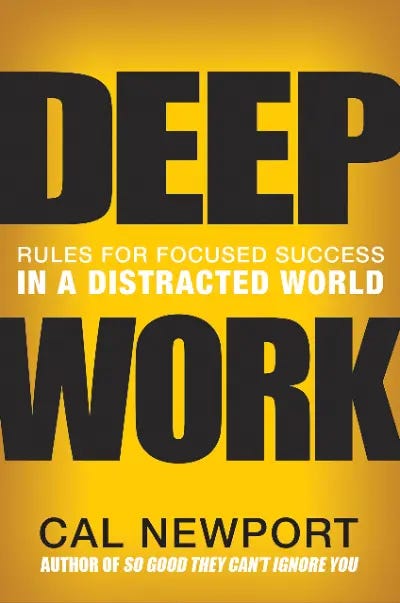
The guide to working optimally.
‘Flow’ is an important state. It can be experienced when one is so involved in the task at hand that everything else is forgotten.
This allows us to deepen our cognitive abilities and help us perform our best. As we know, the modern lifestyle is taking away our ability to experience ‘flow’.
“Who you are, what you think, feel, and do, what you love — is the sum of what you focus on.”
Cal Newport tells us that to survive in the new economy, we need two important skills:
- Mastering hard things quickly
- Producing high-quality work speedily
He tells us that these skills can only be achieved by practicing ‘deep work’. Deep work is Cal Newport’s lingo for focusing and immersing ourselves in our tasks.
“If you can’t learn, you can’t thrive.”
The important part of deep work is weaning ourselves from distractions. For that, the author provides us with various practical solutions.
I believe that this book is important if we want to discover the true extent of our talents.
2. Just Keep Buying: Proven ways to save money and build your wealth by Nick Maggiulli
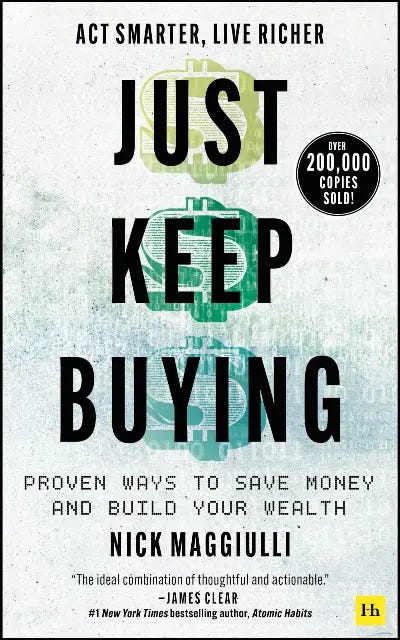
Pathway to riches.
We all want to become rich.
But how? That is the question that plagues our mind
Building wealth is possible. And Nick Maggiulli shows us exactly how.
“If you want to save more, the main point is to tighten up where you can, then focus on increasing your income.”
His focus is on saving and increasing income. For saving, Maggiulli advises us not to use the fixed saving approach. Instead, he advises us to save according to our circumstances.
If earning more, save more. If earning less, save accordingly. In short, don’t make yourself miserable in order to save.
The author strongly emphasizes the importance of investing in income-producing assets.
One of the income-producing assets is stock. The author says the key is to keep buying them regardless of the surrounding situations.
This book is an important financial guide for those who want to increase their wealth.
3. Thinking, Fast and Slow by Daniel Kahneman
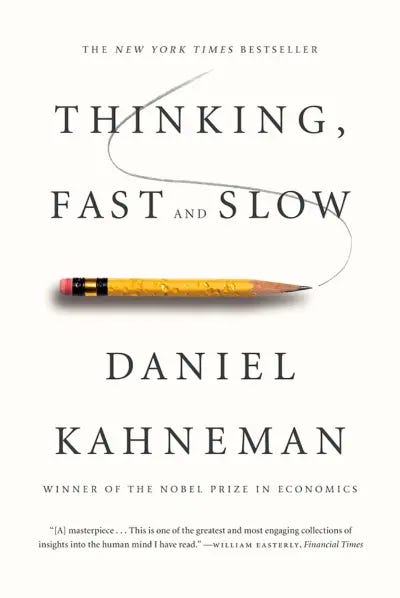
Get to know the decision maker.
Our brain uses intuition (fast thinking) and analysis (slow thinking) to make decisions.
This book teaches us how to engage both of these systems at the right time.
“We can be blind to the obvious, and we are also blind to our blindness.”
Slow thinking, also referred to as system 2, requires more mental energy. When we are tired and depleted, we find it difficult to think analytically. In such cases our brain resorts to thinking fast (system 1).
System 1 is impulsive and biased. It makes us see the easiest option.
In order to make a rational decision, we need to engage system 2 and look at multiple factors related to a decision.
“Bad emotions, bad parents, and bad feedback have more impact than good ones, and bad information is processed more thoroughly than good.”
The author goes on to discuss the reason why humans struggle to think statistically. He discusses various cognitive biases and heuristics that explain why.
Some of these are overconfidence bias, anchoring bias, and confirmation bias.
4. Thinking in Bets: Making Smarter Decisions When You Don’t Have All the Facts by Annie Duke
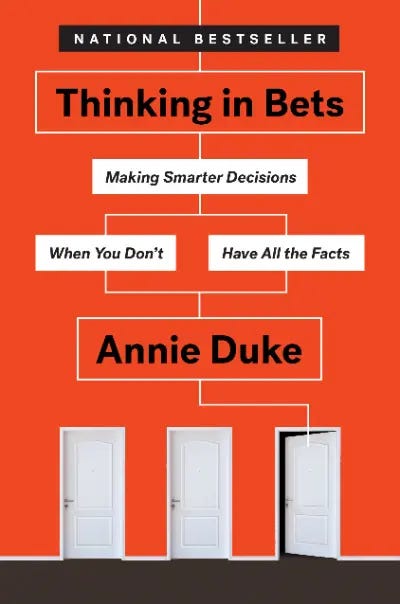
Life is like poker.
Every decision that we make is a bet.
It’s not a bet against another person. It’s a bet against all the future versions of ourselves.
“To be a better decision-maker, then, requires thinking in bets. That shift involves moving toward objectivity, accuracy, and open-mindedness.”
There is always the role of luck, risk, and change in our decisions. Plus, we don’t ever have all the information.
Hence, the author likens life to a game of poker.
“Learning occurs when we expose our beliefs to the outside world to be vetted, attacked, and refined.”
Through this analogy, Annie Duke helps us acknowledge uncertainty. She also teaches us not to think in terms of ‘right’ and ‘wrong’ only. Whether it is our decisions or our beliefs, we need to understand the complexity of this world.
Doing that will help us become better decision-makers. We will not reject any new piece of information that might challenge our beliefs.
5. The Personal MBA: Master the Art of Business by Josh Kaufman
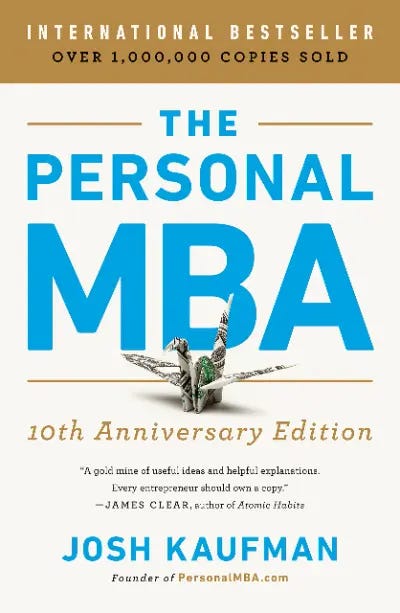
The recipe for a successful business.
Let’s face it! Tuition fees are crazy.
Everyone cannot just sign up for an MBA. If you can’t, don’t be down. Because this book promises to be your ‘personal MBA’.
It is a comprehensive guide to launching and managing your business.
“…people assume that they need to attend business school to learn how to build a successful business or advance in their career. That’s simply not true.”
The author tells us that the best business is the one that creates the most value for its customers.
He lists down five main processes important for any business:
- Creating value
- Marketing
- Selling
- Delivering value
- Managing finances
“Learn everything you can from your competition, and then create something even more valuable.”
Before launching a business, the author tells us to become a customer of the competition. This way, you will be able to analyze the product they are offering.
You can create an even better one.
6. The Art and Business of Online Writing: How to Beat the Game of Capturing and Keeping Attention by Nicolas Cole

Becoming a writer on the internet.
The Internet has brought us many opportunities. One of them is to publish our work for the whole world to see.
If you are a writer or an aspiring one, there must be many questions in your mind.
Where should I write? How can I carve out my niche? How can I earn by writing?
This book answers these questions and many more.
“When people read online, they don’t actually “read.” What they do is skim. Browse. Scroll. They let their eyes gloss over the words, and if something compelling catches their eye in the first two, five, maybe ten seconds (a word, a subhead, a phrase), then they’ll stop skimming and start reading.”
Nicolas Cole is someone who has written extensively on the internet. He has accumulated millions of views on his writings.
As someone who has done it all, he is the person you should trust.
He tells us not to start our own blog. Instead, write on already established platforms like social media, Medium, or Wattpad. He also teaches us how to write the perfect headline and the perfect post.
Making money comes later. First, perfect your craft for writing for the public. Spend 6 to 12 months doing it. Only then, you can think about earning.
For anyone seeking to become a writer through the internet wormhole, this book is the perfect pick.
7. A Short History of Nearly Everything by Bill Bryson
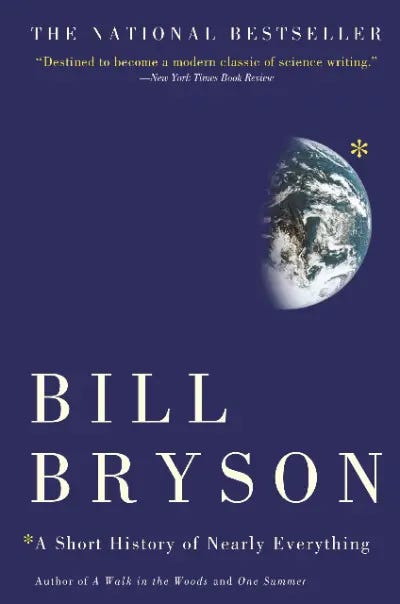
Let’s fly to the past.
Bill Bryson takes us on a tour of history.
On our tour, he acquaints us with the many theories and discoveries made by humans.
“If this book has a lesson, it is that we are awfully lucky to be here — and by ‘we’ I mean every living thing.”
Bryson starts from the cosmos and the Big Bang. He also introduces the concept of atoms.
We also learn about the measurement of earth, volcanoes, physics, chemical elements, and bacteria.
From geology to astronomy, the author introduces us to various scientists and their cohorts. He also tells us about the contributions of those who often go unnamed.
Through the intertwining of science and history, we get to look at our world in a new way.
“Every atom you possess has almost certainly passed through several stars and been part of millions of organisms on its way to becoming you.”
This book is written chronologically. The writing style is easy and engaging hence it makes for an immersive read.
8. Atomic Habits: An Easy & Proven Way to Build Good Habits & Break Bad Ones by James Clear
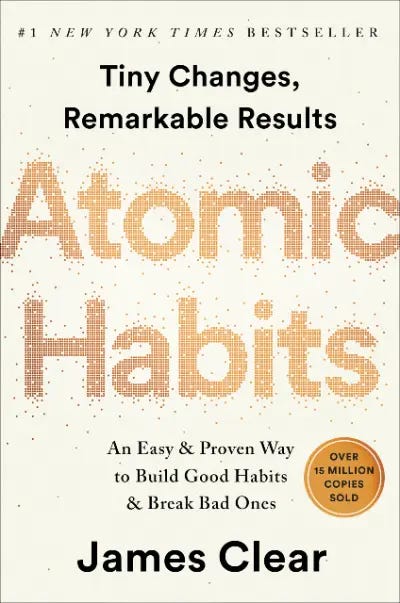
Take baby steps. You’ll get there.
I know I want to be fit at 90. (if I live that long)
But thinking about this goal is overwhelming.
However, it won’t be overwhelming if I focus on making small but long-term changes. For example, going for a walk daily.
“It is so easy to overestimate the importance of one defining moment and underestimate the value of making small improvements on a daily basis.”
James Clear convinces us about the power of small changes. He motivates us to improve by 1% every day.
Along with emphasizing the importance of habits, the author also tells us how to stick to good habits and kick off the bad ones.
“You get what you repeat.”
For that, he uses the Laws of Behavior change. It tells us to make good habits obvious, easy, satisfying, and attractive.
While the bad habits should be made invisible, difficult, unfulfilling, and unattractive.
This is the book you should read if you want to reach your goals.
9. Influence: The Psychology of Persuasion by Robert B. Cialdini

Learn the magic of making people say ‘yes’.
The conclusions derived in this book weren’t made from a study table. In fact, Robert Cialdini muddied his hands in the fields to reach them.
He worked undercover for three years to conduct his research. In this video, he shares how he was found out while being a part of training in a company that was selling smoke alarms.
“The truly gifted negotiator, then, is one whose initial position is exaggerated enough to allow for a series of reciprocal concessions that will yield a desirable final offer from the opponent, yet is not so outlandish as to be seen as illegitimate from the start.”
Based on his research, Cialdini devised 6 principles of influence. As you read through them, they make all the sense.
- Reciprocation: When someone does something for us, we repay the favor.
- Liking: We tend to agree with those whom we like.
- Social Proof: Following others around us.
- Authority: We listen to those who have authority e.g. a doctor.
- Scarcity: When something is limited in amount, it is more valuable.
- Commitment and Consistency: We tend to behave in accordance with our beliefs, ideas, and commitments.
“As the stimuli saturating our lives continue to grow more intricate and variable, we will have to depend increasingly on our shortcuts to handle them all.”
This book tells us how marketers and leaders persuade us and how we can persuade others.
10. The 7 Habits of Highly Effective People by Stephen R. Covey

Collaborate to succeed!
The author defines success as more than money or fame. He counts personal growth and fulfillment as an important part of success.
″Paradigms are powerful because they create the lens through which we see the world.″
Stephen R. Covey tells us about paradigms. Paradigms dictate how we see stuff. In order to bring about change for success, we need to shift our paradigm. This means changing the beliefs and assumptions that are behind our paradigms.
The author goes on to discuss 7 habits important for success. They are as follows:
- Be Proactive
- Begin With the End in Mind
- Put First Things First
- Think Win-Win
- Seek First to Understand, Then to Be Understood
- Synergize
- Sharpen the Saw
“To relate effectively with a wife, a husband, children, friends, or working associates, we must learn to listen.”
We learn about the importance of taking control of our lives. We also learn about formulating goals and prioritizing our time and energy.
The author focuses on our relationship with others. He advises us to seek to understand others and work in collaboration with them.
This book was included in “The 25 Most Influential Business Management Books” by Times in 2011.
I hope you have found this article useful. If you did, it would be awesome if you gave me a clap or left a response!
If you enjoyed this article and want to support Novel Nest, click this link to get notified whenever I publish something new.
If you enjoyed these book recommendations, check out the rest of my book lists on my blog- https://www.thenovelnest.com/blog
Affiliate Disclaimer: This post features Amazon affiliate links, which means I may earn a small commission if you make a purchase through these links.
